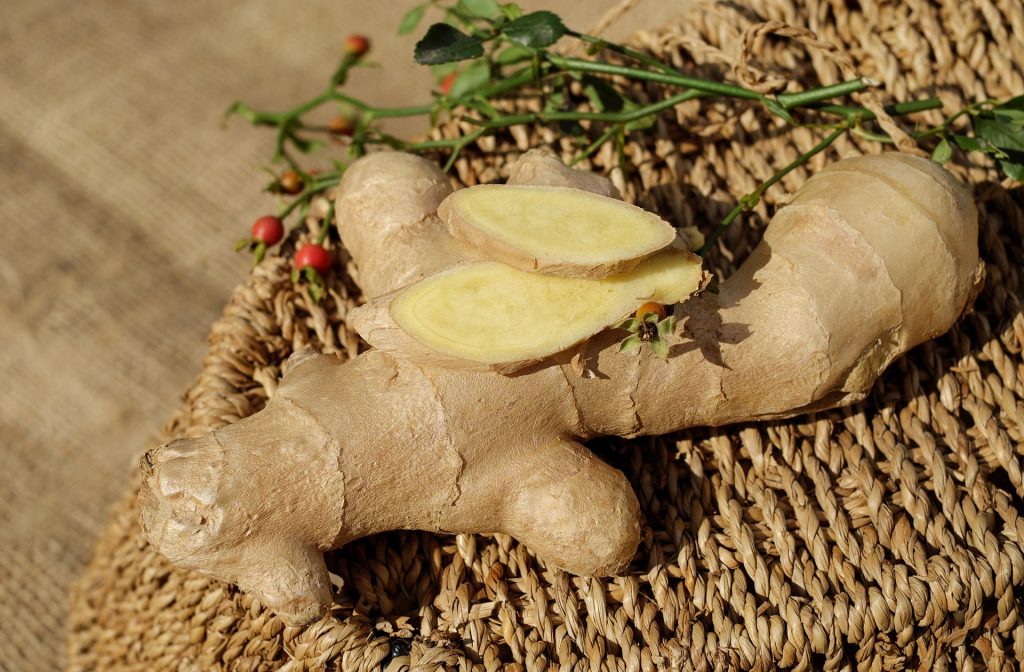 Ginger (Zinger officinale) is a medicinal plant that has traditionally been used in Chinese and Ayurvedic medicine. It is the root (rhizome) of the ginger plant that possesses medicinal properties. Ginger root is readily available from supermarkets which makes it a very accessible healing tool. The number of ailments and diseases that are reported to respond positively to ginger are numerous. The diverse medicinal function of ginger relates to its mechanism of action, in that consumption of ginger provides a general anti-inflammatory effect. This effect is likely due to the presence of terpenoids in the volatile oil, as well as a a number of phenolic compounds such as the gingerols. Because many diseases have an underlying proinflammatory aspect, ginger is incredibly useful as a medicinal tool against these diseases. However, as well as the anti-inflammatory effects, ginger is reported to possess a number of other effects in humans and animals, and this includes a pronounced effect to lower blood glucose levels.
Ginger (Zinger officinale) is a medicinal plant that has traditionally been used in Chinese and Ayurvedic medicine. It is the root (rhizome) of the ginger plant that possesses medicinal properties. Ginger root is readily available from supermarkets which makes it a very accessible healing tool. The number of ailments and diseases that are reported to respond positively to ginger are numerous. The diverse medicinal function of ginger relates to its mechanism of action, in that consumption of ginger provides a general anti-inflammatory effect. This effect is likely due to the presence of terpenoids in the volatile oil, as well as a a number of phenolic compounds such as the gingerols. Because many diseases have an underlying proinflammatory aspect, ginger is incredibly useful as a medicinal tool against these diseases. However, as well as the anti-inflammatory effects, ginger is reported to possess a number of other effects in humans and animals, and this includes a pronounced effect to lower blood glucose levels.

Elevated blood glucose levels are associated with elevations in lipid levels. Therefore it might be expected that because ginger has the potential to lower blood glucose levels, it may also possess the ability to lower blood lipid levels. This is indeed the case. In a number of animal experiments blood lipid levels were raised through administration of fructose to the animals. This elevated level of blood lipids was then normalised through administration of extracts of ginger. Interestingly the administration of fructose also caused a significant increase in the body weight of the animals. Following consumption of ginger extract in their diets, the animals body weight decreased. The effects of ginger against blood lipid level elevations appears to be due to the concentration of the active component gingerol in the extract administered. Ginger extracts with high concentrations of gingerol appear to be more efficient at lowering blood lipid levels compared to ginger extracts with low concentrations of gingerol. This suggests that it is gingerol that is the beneficial blood lipid lowering component of ginger.
In mice experiments, administrations of a ginger extract containing gingerols has been shown to be effective at lowering elevated blood glucose levels. In addition, administration of gingerol containing ginger extracts has also been shown to lower blood insulin levels. This may suggest that gingerol is able to improve insulin sensitivity and increase glucose disposal in the peripheral tissues. In fact, measurements of insulin sensitivity in the animals showed an improvement following administration of ginger extracts. Rat experiments show that administration of ginger extracts decreases blood glucose levels, decreases urine output and decreases drinking in diabetic rats. In addition, ginger extracts are protective of body weight gain in diabetic rats. Ginger also possesses compounds that can inhibit the aldose reductase enzyme that is responsible for some of the detrimental effects of diabetes. This effect greatly reduces the synthesis of sorbitol and in this way ginger is comparable to the aldose reductase inhibiting drugs used in diabetes treatment.
Eat Well, Stay Healthy, Protect Yourself
RdB
